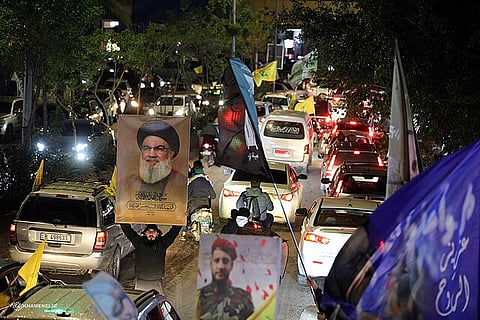

Hezbollah supporters gathered in strongholds across Lebanon on Saturday to mark one year since the assassination of their longtime leader, Hassan Nasrallah, who was killed in a massive Israeli airstrike on Beirut. The commemorations honor the man who led the powerful Shi'ite religious, political, and military group for more than three decades, a period defined by his steadfast resistance against Israeli military dominance in the region. The emotional gatherings, which included projections of Nasrallah's image on Beirut's iconic Raouche rocks, come as the group faces significant pressures, including a renewed push for its disarmament, which it has categorically rejected.
On the evening of September 27, 2024, the Israeli Air Force conducted a targeted airstrike on a Hezbollah headquarters complex located deep beneath residential buildings in the Haret Hreik suburb of Beirut. The operation, codenamed "New Order" by the Israel Defense Forces, involved dropping more than 80 bombs, effectively destroying the underground bunker where Nasrallah and other senior officials were meeting. The strike resulted in at least 33 fatalities, including senior Hezbollah commander Ali Karaki and a high-ranking Iranian Revolutionary Guard Corps general, and injured over 195 people. Hezbollah confirmed Nasrallah's death the following day, a loss that represented the most significant blow in a series of Israeli attacks that had already targeted the group's leadership and communication networks.
Hassan Nasrallah became Secretary-General of Hezbollah in 1992 after his predecessor, Abbas al-Musawi, was also assassinated by Israel. Over his 32-year tenure, he transformed the group into Lebanon's most powerful force and a key player in the Iran-led "Axis of Resistance". He was widely credited across the Arab world for spearheading the resistance that led to Israel's withdrawal from southern Lebanon in 2000, ending an 18-year occupation. Nasrallah's legacy was further cemented during the 2006 war with Israel, which he framed as a "Divine Victory" for withstanding one of the region's most powerful militaries. His fiery speeches and charismatic leadership made him a hero to many who saw him as the definitive face of resistance against Israeli aggression.
In a personal reflection, Nasrallah's son, Jawad, revealed that his father was consumed by rage in his final days over Israel's earlier detonation of explosives-rigged pagers used by Hezbollah members, an operation that killed and maimed dozens. Jawad described learning of his father's death from news reports while displaced, a experience shared by over a million Lebanese. He spoke of a profound sense of alienation during the war, as Shiite Muslims fleeing bombardment were often viewed with suspicion in other Lebanese communities. The conflict's devastation delayed a formal burial for months, and his grave has since become a site for followers and family to pray and seek guidance.
In the year since Nasrallah's death, Hezbollah has faced a series of profound challenges, including the subsequent killing of his heir apparent, Hashem Safieddine, and the toppling of its key ally, Syrian President Bashar al-Assad. The group is now under growing pressure from the Lebanese government and international community to disarm, a demand it has flatly rejected. Senior Hezbollah official Mohammed Fneish acknowledged that losing Nasrallah was "a very painful blow," but insisted the group has successfully regrouped, filling leadership positions and maintaining its social and military institutions. While an Israeli military assessment concedes Hezbollah's influence has declined, it also notes the group is attempting to rebuild its capabilities. Current Secretary-General Naim Qassem, who assumed leadership a month after Nasrallah's killing, is now tasked with steering the organization through its most difficult period.